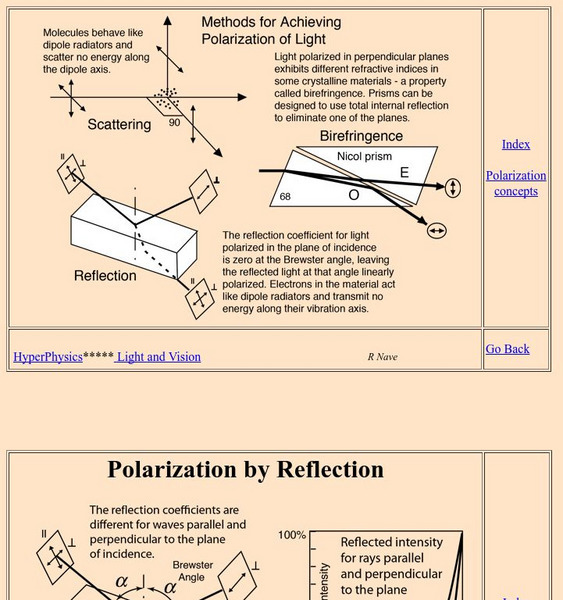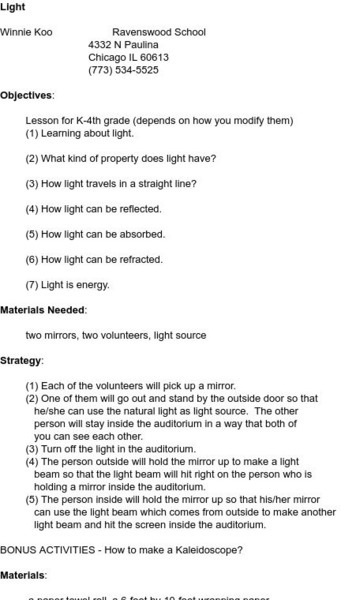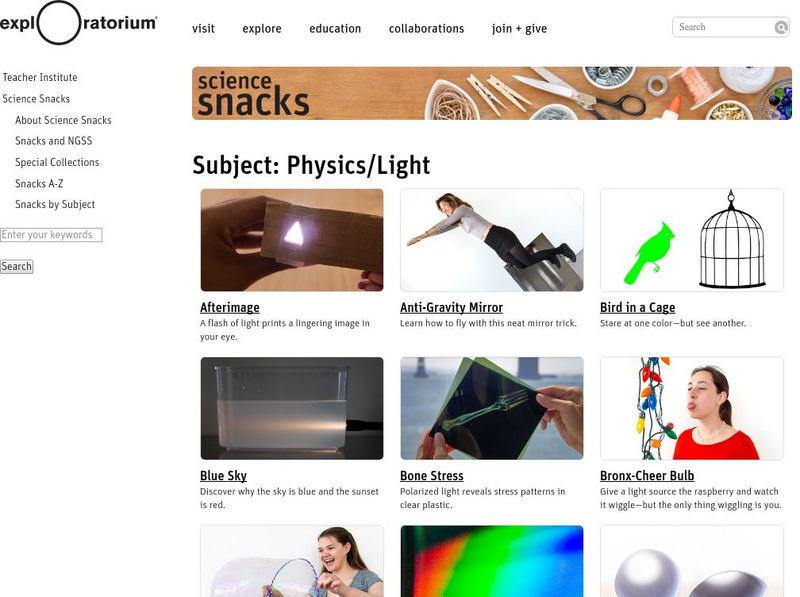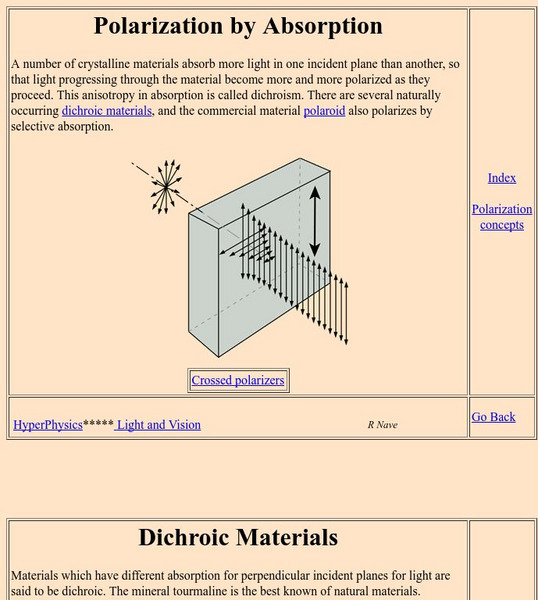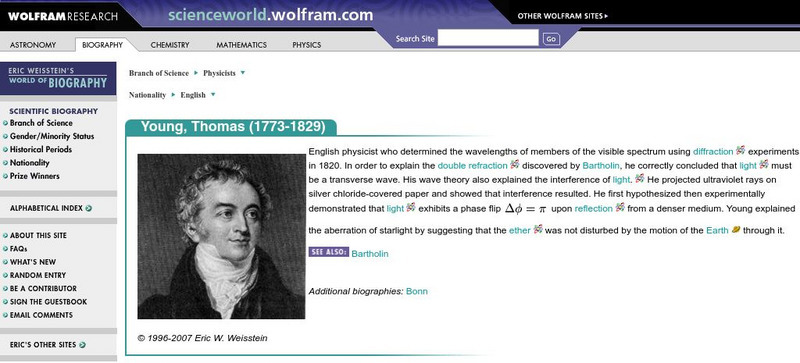Georgia State University
Georgia State University: Hyper Physics: Methods of Polarization
At this college physics department site, the polarization of light is explained and illustrated as well as the primary methods of polarization (scattering, reflection, and refraction).
TeachEngineering
Teach Engineering: Learning Light's Properties
Students learn the basic properties of light--the concepts of light absorption, transmission, reflection and refraction, as well as the behavior of light during interference. Lecture information briefly addresses the electromagnetic...
Physics Classroom
The Physics Classroom: Light Waves and Color: Wavelike Behaviors of Light
In this series of interactive physics tutorials, students will focus on the wavelike nature of light.
University of Maryland
Optics Highlights: Optics, Electromagnetic Waves, Quanta
Part of an anecdotal history on optics and the study of light. Extremely thorough treatment of the scientific evidence which led scientists to believe in the particle nature of light. Includes a short biographical sketch and discusses...
Physics Classroom
The Physics Classroom: Light Waves and Color: Thin Film Interference
Students investigate an example of interference that provides further evidence in support of the wavelike behavior of light.
Physics Classroom
The Physics Classroom: Light Waves and Color: Polarization
Through illustrated practice problems and video clips, students learn about polarization of light.
ClassFlow
Class Flow: Introduction to Light
[Free Registration/Login Required] This flipchart introduces fifth graders to the science of light. Principles such as transparent, translucent, opaque, reflection, and refraction are covered. Concave and convex mirrors and lenses are...
Other
Propagation of Light Using Geometry
A discussion of Christian Huygens' contribution to wave optics, and particularly to our understanding of the reflection and refraction of light. Excellent diagrams and a geometric proof on why the law of reflection is mathematically...
Exploratorium
Exploratorium: Critical Angle
Students can see light reflected and refracted in this demonstration. They will also discover the total internal reflection of light.
Physics Classroom
The Physics Classroom: Polarization
"How Do We Know Light Behaves as a Wave?" An answer is provided in this discussion of the polarization of light and the use of Polaroid filters in sunglasses. The four methods discussed on this page are: polarization by transmission,...
Boston University
Bu: Optics: Geometric Optics
Several short descriptions of demonstrations which illustrate principles of geometric optics (many of which focus upon refraction).
Science and Mathematics Initiative for Learning Enhancement (SMILE)
Smile: Light (K 4)
This site provides two activities that students can do in class. One uses mirrors to reflect light beams whole another is making a kaleidescope.
Mocomi & Anibrain Digital Technologies
Mocomi: What Is Scattering of Light?
Do you know why the sky is blue? Article defines scattering and how it works. Explains the difference between the scattering of light and reflection or refraction.
Exploratorium
Exploratorium: Science Snacks: Physics/light
Here is a large collection of simple science class activities for understanding the physics of light.
Georgia State University
Georgia State University: Hyper Physics: Crossed Polarizers
At this univeristy physics department site, the polarization of light is explained and illustrated. Methods for analyzing light to determine the degree of polarization are stated and explained with equations.
Georgia State University
Georgia State University: Hyper Physics: Polarization by Absorption
The operation of Polaroid filters on a pair of sunglasses is shown.
Walter Fendt
Walter Fendt: Apps Zur Physik
This site, in German, offers numerous apps that illustrate common physics principles. Apps are organized into categories: mechanics, oscillations and waves, electrodynamics, optics, thermodynamics, the theory of relativity, physics of...
Other
Open School Bc: Sound and Light
The Sound and Light interactive investigates these two forms of energy. Students will enjoy exploring how sound and light are created, travel, and can be controlled.
CK-12 Foundation
Ck 12: Fourth Grade Science
This customizable digital textbook covers topics related to fourth-grade science. It is Next Generation Science Standards (NGSS) aligned.
Synopsys
Synopsys: A Gentle Intro to Optical Design: Why Is the Sky Blue?
Discusses Rayleigh scattering in plain language and attributes the blueness of the skies to this phenomenon. Discussion of scattering is just one topic of many on this lengthy page of optical topics.
University of St. Andrews (UK)
University of St. Andrews: Augustin Fresnel
A short biographical sketch on the life and work of Augustin Fresnel (1788-1827). Comments on a few of his scientific accomplishments.
Exploratorium
Exploratorium: Snacks
Exploratorium's snacks aren't edible, but they are good! Use your science skills to discover gravity, learn about biology, do fun experiments.
Wolfram Research
Wolfram Science World: Young, Thomas
This site from ScienceWorld provides a very short but factual biographical sketch of Thomas Young (1773-1829 CE) and describes his most notable scientific discoveries and contributions. Links are also provided throughout for additional...


